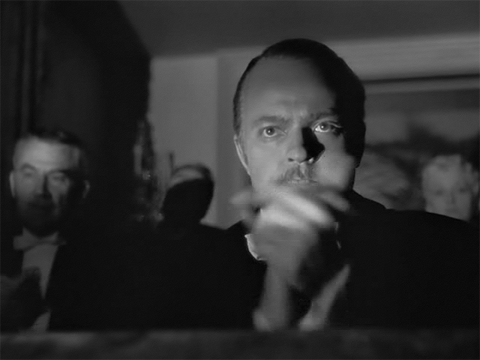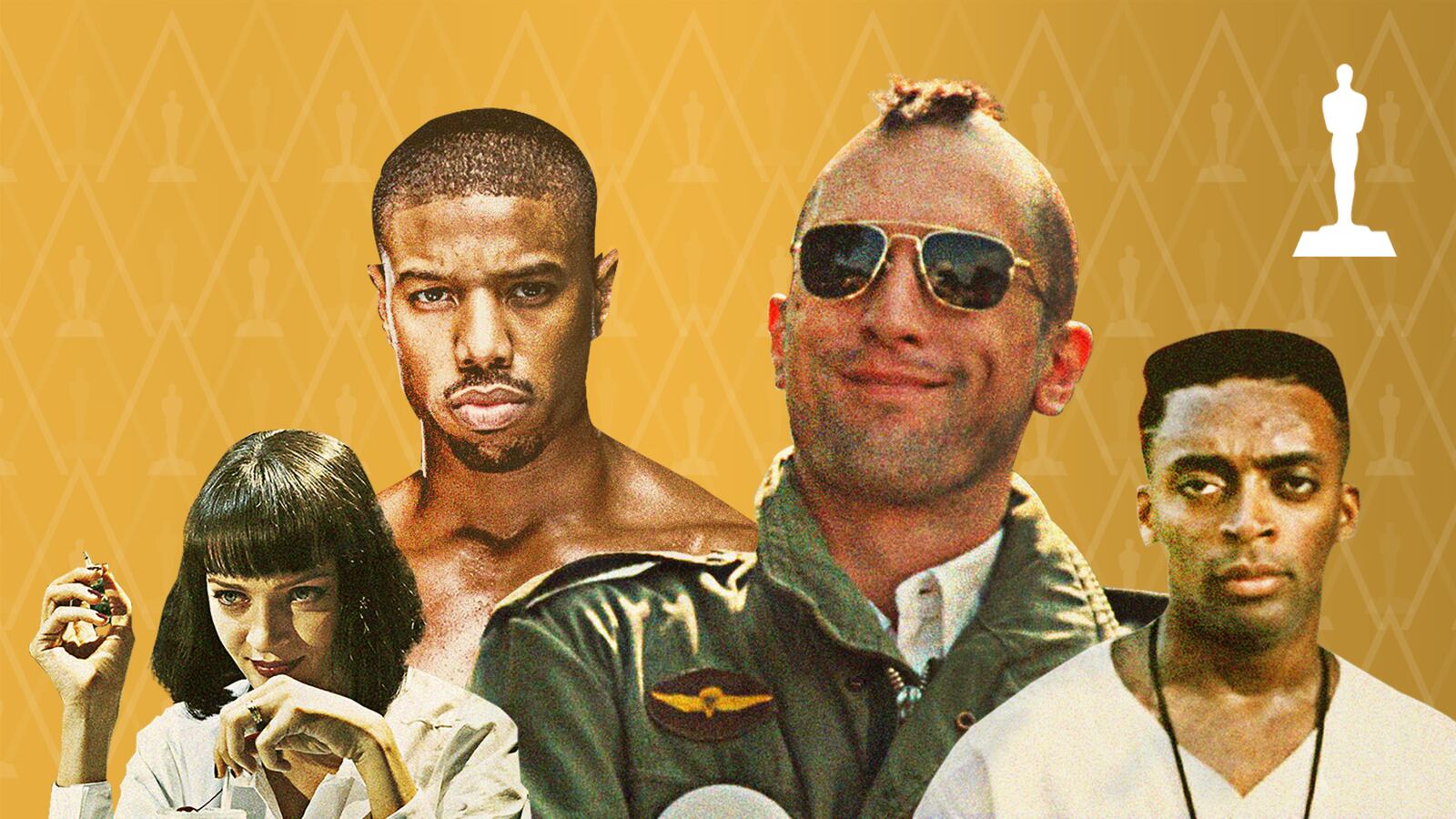Kevin: What are the Academy Awards, if not an annual occasion for movie fans, culture critics, and, in recent years, the social media army to air their trophy-related grievances and whine about cinematic injustice? At the most trite, it’s a matter of bemoaning the fact that your favorite actor or performance of the year didn’t win an award that adjudicates art arbitrarily anyway. (Felicity Huffman, you’re an Oscar-winner in my heart for Transamerica—damn you, Reese Witherspoon!) At best, it’s an essential catalyst for debate over the meaningfulness of the arts in provoking and reflecting culture, and the problematic institutional failures that exist when the Academy doesn’t live up to that responsibility.
Marlow: [in Reese Witherspoon/JCC voice] “Baby, baby, baby…” I agree that it’s arbitrary, and at the same time I’m of the opinion that there are so many goddamn Philistines in this world (see: Trump supporters) that anything that shines a huge spotlight on the arts is fine by me. It’s nice to see even casual film fans get worked up about the awards, too. There’s a fun we’re all in this together vibe around awards season, and for all the griping about the Oscars, from its egregious winners to its truly bizarre excesses, it does inspire moviegoers to check out films they’d otherwise avoid, expanding their horizons a wee bit.
Kevin: Is it fair to say that #OscarsSoWhite is the Academy’s biggest misstep in its history? It’s hard to take the controversy out of the context of our Culture of Outrage and the fuel the ever-louder blogosphere adds to the fire. But it’s important to look at it in the context of the larger industry-and culture-wide illness of which the Academy’s failure to nominate a single person of color for the second year in a row—when, contrary to some rebuttals, there were worthy nominees both years—is one of the most glaring symptoms.
Marlow: Inclusion is so important. For historically oppressed minorities, it gives its people models to follow, and tells them they’re not alone in the world. To quote the great Junot Diaz, “If you want to make a human being into a monster, deny them, at the cultural level, any reflection of themselves.” So this #OscarsSoWhite issue really is representative of the iniquities in the film industry pertaining to minorities—from why there are so few studio executives, filmmakers, and actors of color gracing the big screen to why non-white Oscar-winners typically play oppressed non-whites in historical dramas, so awarding them the statue for this role, instead of that of the contemporary hero, plays into white guilt (since the Academy is mostly white), acting as a form of cultural reparations. To have 40 acting nominees in a row be white when there were so many non-white actors worthy of the notice, from Benicio Del Toro, Idris Elba, and Michael B. Jordan this year to Gugu Mbatha-Raw and David Oyelowo last year, is a very big problem indeed.

Kevin: We could talk for days about the actors who weren’t nominated—and I would, gladly, preach from the mountaintops until the end of time about Jordan not even being a serious part of the Oscar conversation for Creed. But let’s move on to another of my favorite pastimes: screaming about the films that won when they definitely should not have! (I’m fun at parties.) There are the famous examples, of course, like How Green Was My Valley besting Citizen Kane—you know, just the greatest movie of all time—in 1942, or the be-all-end-all of whaaat!? Oscars outrage: Crash. You know things are bad when the movie’s own director said he didn’t think it should’ve won. But I’m going to go more recent, to last year and Birdman. Birdman, a movie that really didn’t make any sense and was often painfully boring, tricked us into thinking it was the dawn of the next age in cool cinema when the real harbinger of that very thing—the mesmerizing, inventive, and resonant Boyhood—should have won instead.
Marlow: I’m still upset about Boyhood losing to Birdman—almost a year later. For me, Birdman was one extended shooting/editing gimmick pulled off beautifully by master cinematographer Emmanuel Lubezki and buoyed by a handful of excellent performances, but also served as another example of Hollywood waxing philosophical about how difficult it is to be an actor (woe is the plight of the fading Hollywood megastar!) as well as the industry patting itself on the back during awards season, a la Argo (Hollywood saves the world!) or The Artist. Boyhood, on the other hand, was a gripping meditation on time and the tapestry of life, brimming with love and longing.
Kevin: Oh my god. Marlow, I kid you not, I forgot The Artist was even a movie until you mentioned it just then. Guess its impact has been pretty quiet, eh? (That was a joke about The Artist being a silent film. I’m here all night.)

Marlow: Ba dum tss. And I argued this at the time, but another recent example is The King’s Speech besting a murderer’s row of films: The Social Network, The Fighter, Inception, Toy Story 3, Black Swan, and Winter’s Bone. Any of those films is better than the handsome made-for-TV movie that is The King’s Speech. I love a good underdog sports flick, too, but how about Rocky taking home Best Picture in ’76 over Taxi Driver, Network, and All the President’s Men? Yikes. Or, when it comes to Hollywood’s problematic history with race, the thoroughly backwards Driving Miss Daisy winning Best Picture over not only superior films like My Left Foot, Born on the Fourth of July, and Dead Poets Society, but also the fact that Spike Lee’s Do the Right Thing, an impassioned, inspired take on race relations in America—and the best movie released that year—wasn’t even nominated.
Kevin: But too often the Academy does the wrong thing, amirite? (This thing on?) For example, category fraud! Oh we could spin all your heads dizzy with talk about category placement politics and the Academy’s ridiculous history with category fraud, but it all boils down to: studios often campaign their actors in the category—supporting or lead—that they think he or she has the best chance of winning, whether or not it’s where they belong and, sometimes, it really just sucks! This year features some pretty egregious examples of it, like Rooney Mara and Alicia Vikander in supporting for films (Carol and The Danish Girl) in which they are so clearly co-leads because, well, why would you want to compete against Cate Blanchett or Brie Larson in Room if you didn’t technically have to?
Marlow: Also, Alicia Vikander was far better in the overlooked Ex Machina, a film people will actually be talking about five years from now, but that’s a different story…
Kevin: People, it’s dumb, and because of it there are cases like Jennifer Connelly winning Best Supporting Actress for A Beautiful Mind or Rachel Weisz triumphing in supporting for The Constant Gardner because they were leading roles with far more screen time than their fellow nominees. It’s the Oscars’ version of doping in my opinion. Like I’ve always said, Jennifer Connelly is the original Lance Armstrong.

Marlow: Jennifer Connelly is my childhood crush (see: The Rocketeer) so I find that comparison genuinely disturbing. But I wanted to go back to Best Picture, because I’m getting upset just looking at all these silly past winners. There are so many:
Dances with Wolves over Goodfellas. A Beautiful Mind over The Lord of the Rings: The Fellowship of the Ring (and the un-nominated Mulholland Drive and Memento). Forrest Gump over Pulp Fiction and The Shawshank Redemption. Kramer vs. Kramer over Apocalypse Now (and the un-nominated Manhattan, Alien, and Being There). Oliver! over the un-nominated (!) 2001: A Space Odyssey and Rosemary’s Baby. My Fair Lady over Dr. Strangelove. Around the World in 80 Days over The Ten Commandments, Giant, and the un-nominated Vertigo and Touch of Evil. Or how about—with all due respect to Jimmy Stewart’s sad, murderous clown—one of the worst Best Picture winners ever, The Greatest Show on Earth, winning out over High Noon and The Quiet Man, as well as the un-nominated Singin’ in the Rain and Rashomon? One thing is for sure: The Academy rarely gets it right here.
Kevin: Whoa! I am impressed. There’s a lot to say—clearly—about how hindsight changes our view of “Best” picture over the years. Surely, Oscar voters didn’t think they were committing crimes against art when they voted for any of these. But that’s what bothers me about films like The Artist or Birdman winning: voters get so influenced and wrapped up in campaigns, narratives, and politics that they don’t often consider what, if any, the lasting legacy of the eventual winners will be.
Marlow: Agreed, and wait, I’m not done! Alfred Hitchcock. David Lynch. Orson Welles. Robert Altman. Ingmar Bergman. Akira Kurosawa. Federico Fellini. Sidney Lumet. So many great filmmakers haven’t won the Best Director Oscar. Oh, and someone please tell Kanye West that Stanley Kubrick never won the Academy Award for Best Director—perhaps it will provoke one of the GREATEST ALL-TIME anti-Oscars Twitter rants.
Kevin: Marlow, please do not encourage Kanye.

Marlow: Kanye needs more than encouragement, apparently. But heck, the legendary Howard Hawks, who helmed classics like Scarface, His Girl Friday, To Have and Have Not, and Rio Bravo, was only nominated once (Sergeant York), while Charlie Chaplin and Sergio Leone received zero directorial nods. And while we’re talking snubs, Francis Ford Coppola lost Best Director for The Godfather to Bob Fosse for Cabaret. For shame.
Meanwhile, the list of actors who’ve never won an Oscar reads like a who’s who of Hollywood: Tom Cruise, Leonardo DiCaprio, Gary Oldman, Glenn Close, Samuel L. Jackson, Lauren Bacall, Richard Burton, Greta Garbo, Albert Finney, Mia Farrow, Peter O’Toole, Cary Grant, Kirk Douglas, Harrison Ford, and more, while two of the best character actors in Hollywood history—Peter Lorre and Edward G. Robinson—failed to receive a single nomination. This is giving me a headache just thinking about it.
Kevin: I feel like you really went through something right there. Take a breath. Have a glass of wine. Pop a Valium. Meanwhile, I’m going to watch the YouTube video of Anjelica Huston winning the Oscar for Prizzi’s Honor and spit at the screen because that was Oprah’s award, dammit, and our queen was robbed. I also might join you in taking some happy pills and drug myself through Sunday night because I have a bad feeling The Revenant is going to win and a person can only take so much nonsense, Marlow. Sweet dreams.







